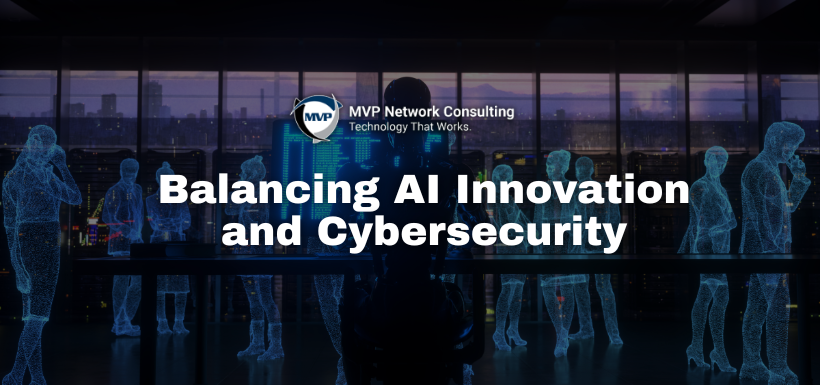Balancing AI Innovation and Cybersecurity

Ikram Massabini
October 3, 2025

Artificial intelligence is no longer the stuff of science fiction. It is not a sentient system trying to take over the world, but rather a powerful tool that can help businesses work faster and smarter. Across industries, companies have rapidly adopted AI solutions to automate repetitive tasks and analyze data with unprecedented depth and accuracy.
While AI can dramatically boost productivity, it also introduces new challenges for cybersecurity, privacy, and data protection. The key question every organization faces is how to take advantage of AI’s capabilities while keeping sensitive information safe.
The Expanding Role of AI in Business
AI is no longer exclusive to large corporations with deep pockets. It has become accessible to small and medium-sized businesses thanks to affordable cloud services and machine learning platforms. Today, AI plays a role in nearly every area of business operations, including:
- Email and meeting scheduling
- Customer service and chat automation
- Sales forecasting and trend analysis
- Document creation and summarization
- Invoice management and processing
- Data reporting and analytics
- Cyber threat monitoring and response
AI makes it easier to manage workloads, streamline operations, and improve customer experience. However, with this accessibility comes a new set of security considerations that organizations must take seriously.
Understanding the Risks of AI Adoption
Every innovation carries potential vulnerabilities, and AI is no exception. When organizations implement new technology without proper oversight, it can unintentionally open the door to data breaches and compliance issues.
Data Leakage
AI models rely on data to learn and function effectively. That data may include sensitive client records, proprietary information, or financial documents. If shared with external systems or third-party platforms, that information could be exposed or used in unintended ways. Clear policies are needed to govern what data can be shared and how it is protected.
Shadow AI
Employees often use public AI tools without company approval, such as online chatbots or generative text platforms. Without review or monitoring, these tools can lead to compliance violations or accidental sharing of private data.
Overreliance on AI Output
AI is an excellent assistant but not infallible. It can generate convincing but inaccurate information. When users fail to verify AI-generated results, errors can lead to poor decisions or misinformation that affects business operations.
Practical Steps to Secure AI While Maximizing Productivity
AI security does not have to be complicated. The following best practices can help organizations take advantage of AI safely and effectively.
Establish an AI Policy
Before integrating AI tools, define clear usage guidelines. Outline approved tools and vendors, describe acceptable use cases, restrict access to sensitive data, and determine how long information will be retained. These policies ensure consistent and safe use of AI across all departments.
Choose Trusted AI Platforms
Select AI solutions that comply with recognized security and privacy standards such as GDPR, HIPAA, or SOC 2. Look for vendors that provide encryption for data at rest and in transit, offer data residency controls, and guarantee that customer data is not used for AI training.
Implement Role-Based Access
Use role-based access controls (RBAC) to ensure employees and AI systems can only access the information necessary for their tasks. This limits the potential impact if credentials are compromised.
Monitor AI Activity
Track how AI tools are being used within your organization. Understand what data is being processed, which employees are using specific systems, and whether unusual activity occurs. Monitoring helps detect and prevent data misuse before it becomes a threat.
Leverage AI for Cybersecurity
AI can be both a risk and a defense tool. Many organizations use AI to identify suspicious activity, block phishing emails, and automate responses to threats. Implementing AI-driven security tools adds another layer of protection to your network.
Train Employees on Responsible Use
Even with strong defenses, people remain the most common cause of security incidents. Ongoing employee training is critical to help staff recognize risky behavior, follow policy guidelines, and use AI safely.
Smarter, Safer Productivity
AI has transformed how businesses operate, allowing teams to work faster and make better decisions. However, those benefits come with responsibilities. Productivity without proper protection is a risk no organization can afford to take.
MVP Network Consulting helps businesses adopt AI securely by providing expert guidance, compliance support, and practical tools to strengthen your cybersecurity posture. Contact us today to learn how we can help your organization harness AI safely and confidently.
Resources:
Criminal Proxy Network Infects Thousands of IoT Devices
